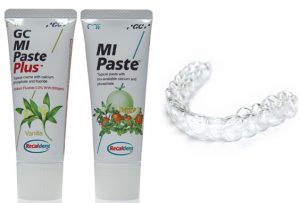Preventive Dentistry is a general term referring to dental procedures or treatments that can avoid dental decay or other oral health disease conditions.
Here are some examples of Products and Services offered by Mint Dental to emphasize preventive dental care:
Fluoride is a compound that contains fluorine, a natural element. Using small amounts of fluoride on a routine basis can help prevent tooth decay.
Research shows that community water fluoridation has lowered decay rates by over 50 percent, which means that fewer children grow up with cavities.
Fluoride can be found as an active ingredient in many dental products such as toothpaste, mouth rinses, gels and varnish.
Fluoride inhibits loss of minerals from tooth enamel and encourages remineralization (strengthening of the teeth in areas that are weakened and beginning to develop cavities).
Fluoride also affects bacteria that cause cavities, discouraging acid attacks that break down the tooth.
Risk for decay is reduced even more when fluoride is combined with a healthy diet and good oral hygiene.
Topical fluoride is a preventive agent applied to tooth enamel. It comes in a number of different forms. Fluoride varnish is brushed or “painted” on the enamel. Varnish is especially useful for young patients and those with special needs who may not tolerate fluoride trays.
Children who benefit the most from fluoride are those at highest risk for decay. Risk factors include a history of previous cavities, a diet high in sugar or carbohydrates, orthodontic appliances, and certain medical conditions such as dry mouth.
Call us now for a consultation to see we can help you as parents make decisions concerning appropriate use of fluoride as part of the comprehensive oral health care for your kids.

When it comes to Preventive Dentistry and fighting tooth decay, MI Paste is at the forefront. MI Paste and MI Paste Plus contain RECALDENT (CPP-ACP), which is a special milk-derived protein that can help replace lost minerals in teeth, which makes them stronger and helps protect them from tooth decay and erosion.
Our doctors have used MI Paste as a Preventive Dentistry measure long before starting Mint Dental. When you have a cavity that is just starting and is just within the first layer of the tooth (the ENAMEL) and HAS NOT crossed into the internal layer of the tooth (the DENTIN), it does not need to be drilled & filled.
This area of demineralization can be RE-mineralized using MI Paste on a regular basis in conjuction with your routine oral hygiene practices (flossing, fluoride mouth rinses).
Routine x-rays are necessary to monitor the area to ensure the “cavity” or the demineralized area on the x-ray is getting smaller and NOT progressing into the dentin.
| USE MI PASTE PLUS: | USE MI PASTE: |
|---|---|
| To provide extra protection for teeth | Before and after tooth whitening |
| After tooth whitening | For Pregnant women |
| For desensitizing | For children under six |
| During and/or after orthodontics | During and/or after orthodontics |
| For medically compromised patients | For desensitizing |
| For patients with acidic, oral environments (who drink soda, sugary drinks on regular basis and frequently) | To provide extra protection for teeth |
| For erosion and gastric reflex | |
| For high-caries risk patients (Patients at high risk of getting cavities) |
To find out more information on how MI Paste system can help you fight tooth decay and sensitivity, call us now at (201)-977-6250 to speak to our doctors.
Sealants protect the grooved and pitted surfaces of the teeth, especially the chewing surfaces of back teeth where most cavities in children are found. Made of clear or shaded plastic, sealants are applied to the teeth to help keep them cavity-free.
Even if your child brushes and flosses carefully, it is difficult – sometimes impossible – to clean the tiny deep grooves and pits on certain teeth. Food and bacteria tend to build up in these deep grooves, increasing your child’s risk of getting cavities.
Sealants “seal out” food and plaque, thus reducing the risk of forming a cavity.
If you need for information, call us now to see how Drs. Nilay Shah and Radhika Kapur Shah can significantly reduce your kids’ risk of getting cavities with Sealants.